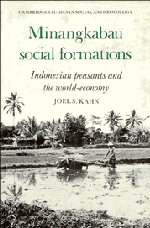Book contents
- Frontmatter
- Contents
- Lists of maps, figures and tables
- Preface
- Map
- 1 Introduction
- 2 The internal and the external in a Minangkabau village: an introduction to the world of the concrete
- 3 Adat, kinship and marriage: the constitution of the subsistence community
- 4 Agriculture and subsistence: the reproduction of the subsistence community
- 5 Commodity production in the village economy: the case of blacksmithing
- 6 Occupation, class and the peasant economy
- 7 The structure of petty commodity production
- 8 Mercantilism and the evolution of ‘traditional’ society
- 9 The emergence of petty commodity production
- 10 Conclusions: The concept of a neo-colonial social formation
- Bibliography
- Glossary of Minangkabau terms
- Index
- CAMBRIDGE STUDIES IN SOCIAL ANTHROPOLOGY
6 - Occupation, class and the peasant economy
Published online by Cambridge University Press: 29 September 2009
- Frontmatter
- Contents
- Lists of maps, figures and tables
- Preface
- Map
- 1 Introduction
- 2 The internal and the external in a Minangkabau village: an introduction to the world of the concrete
- 3 Adat, kinship and marriage: the constitution of the subsistence community
- 4 Agriculture and subsistence: the reproduction of the subsistence community
- 5 Commodity production in the village economy: the case of blacksmithing
- 6 Occupation, class and the peasant economy
- 7 The structure of petty commodity production
- 8 Mercantilism and the evolution of ‘traditional’ society
- 9 The emergence of petty commodity production
- 10 Conclusions: The concept of a neo-colonial social formation
- Bibliography
- Glossary of Minangkabau terms
- Index
- CAMBRIDGE STUDIES IN SOCIAL ANTHROPOLOGY
Summary
While rice cultivation and blacksmithing are the most common occupations of the people of Limo Suku, they are not necessarily the most preferred. Farming throughout the province and smithing in the village are truly the work of peasants (urang kampuang), work which is difficult, hot and uninteresting. All villagers, the young in particular, show greater interest in other possibilities. Many aspire to a job in government service. However lowly, a government clerk (pegawai) has a steady income, lives in an urban environment and avoids dirtying his hands by heavy labour. Almost on a par are those who manage to enter the armed forces. The high value placed on jobs of this sort at the same time leads to an emphasis on the value of education for those who can afford its inevitable costs.
While government service is attractive to some, many aspire to the life of a merchant or trader, the preferred occupation of Minangkabau migrants for centuries. Commercial work combines the practical with the romantic – it provides both an income and a chance to escape what are seen to be the narrow confines of village life.
Within the village, too, it is possible to earn money in other ways, although the alternatives are not nearly so attractive. There are a limited number of entrepreneurial niches. At the same time, local men and women make mats, produce a species of light metal goods known as progol, run small shops and cafés and teach in village schools.
- Type
- Chapter
- Information
- Minangkabau Social FormationsIndonesian Peasants and the World-Economy, pp. 103 - 129Publisher: Cambridge University PressPrint publication year: 1980



